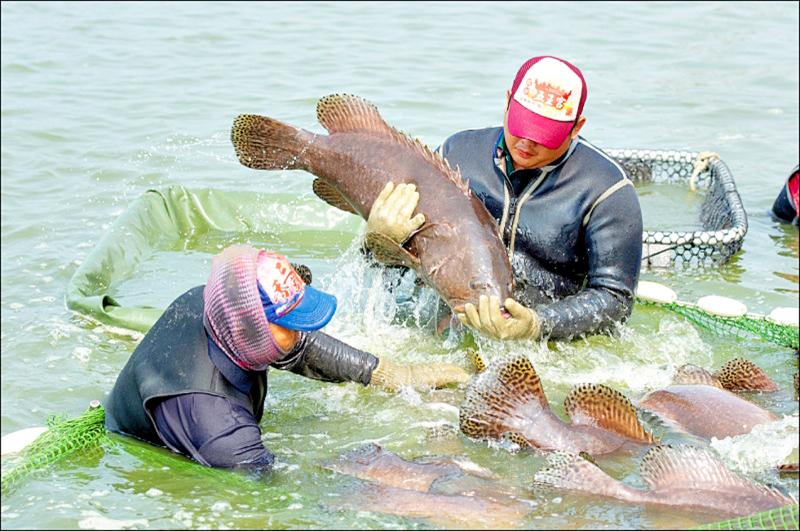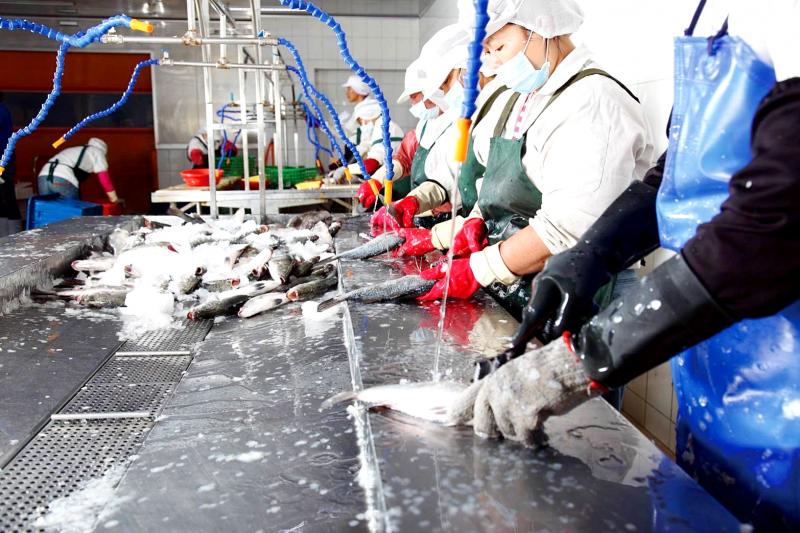Last month China lashed out at Taiwanese agricultural exports again, banning grouper imports. This event marked the ignominious end of what was once the star agricultural product of the ill-starred Economic Cooperation Framework Agreement (ECFA). Local media quoted the Fisheries Agency as saying it was a turning point in Taiwan’s grouper history.
Spurred by the signing of ECFA, by the spring of 2011 grouper had become the leading agricultural export, driving profits for middlemen and food price inflation. Grouper exports were among the few products whose market grew, enabling then-president Ma Ying-jeou (馬英九) of the Chinese Nationalist Party (KMT) to claim that agricultural exports to China had risen in the wake of ECFA.
Grouper exports were so promising that private equity firms switched from investments in chip production to investing in grouper product, processing and shipping, the media reported at the time. In September 2011, the KMT administration announced the completion of a government-funded grouper export ship, an excellent example of how politically-connected firms have their profits internalized but their costs socialized.

Photo: Yang Yuan-ting, Taipei Times
We have grown so used to ECFA’s destructive effects (may whatever churlish gods rule this earth curse forever the gullible media who ran paeans to it before its signing) that we have forgotten about them. In Taiwan, cash crops for the Chinese market replaced food crops, increasing the nation’s dependence on China, and inviting all the other pernicious colonial effects of cash crops.
The early harvest soon wilted as well. As Commonwealth magazine reported in 2014, “the market share of the 539 Taiwanese cross-strait export items on the reduced tariffs list has declined in each successive year since ECFA.”
As numerous media organs reported, China made real inroads into Taiwan’s markets, while Taiwan made few genuine gains, many of them markets created by Beijing’s political orders of Taiwanese agricultural products, rather than growing out of some market superiority of a Taiwanese producer.

Photo courtesy of Kaohsiung City Hall
The rise in grouper was part of a strategy to build Chinese-focused political networks in southern Taiwan and to build its own industries. The profits went, predictably, to politically-connected big processors and shippers, the “grouper kings” as the 2014 piece in Commonwealth called them, not to the small farmers.
In response to the demand from China, Taiwanese exporters shifted from abalone to grouper (in the north this was partly driven by a disease that hit abalone production in 2010). What got a boost? Well, abalone production in Pingtan, the industrial area that China erected specifically to poach technology from Taiwan, increased.
The current ban on grouper was foreshadowed near the end of last year when China announced that it had found forbidden chemicals in grouper shipments from Taiwan. As the New York Times reported, some grouper producers took the hint and switched away from grouper.
It may not be true that the ban last month was triggered by forbidden chemicals, but there was no question that, as the Chinese pointed out, some of the grouper in the shipments they investigated came from sources that were not licensed to export it to China.
The local media reported that there are roughly 2,000 grouper farms, but only 458 are licensed for export. Since the profit on a grouper shipment can reach NT$10 million, it was reported, but fines for license violations are a pitiful NT$150,000, shippers simply shrug at the regulations.
Beijing’s grouper ban highlights two major problems of Taiwan’s cross-strait and foreign relations. First, it shows how Taiwan’s utter failure to punish violators of laws and regulations negatively impacts its export economy and its foreign policy, leaving it vulnerable to punishments and undercutting its displays of righteous indignity.
SCAMMERS AND SHADY LINKS
Readers may recall the deportation of the scammers from Kenya to China in 2016. The government had failed to punish scammers deported back to Taiwan, driving China to finally take action against Taiwanese scammers. Taiwanese fishermen are notorious across the Pacific and elsewhere, yet the government has consistently dragged its feet on regulating them.
Consider also the shady links between Taiwanese businessmen and North Korea and Iran. Taiwanese businessmen have been arrested on several occasions for shipping forbidden weapons and machinery to those nations. Taiwan’s export controls have been the subject of much criticism from abroad.
A 2017 report from the Middlebury Institute of International Studies at Monterey drily noted the “punishment” for a pair of businessmen for shipping NT$10 million worth of technology items to North Korea in 2006-7: “The court sentenced Liu to 115 days in jail and Chen to 100 days in jail and two years of probation, and it fined Royal Team Corporation NT$50,000. The sentences for both individuals were commutable to a fine at the rate of NT$1,000 per day.”
This pattern is common across all punishments for Taiwanese businessmen, for both domestic and international crimes. Periodic violations like this do not reflect well on Taiwan and are not well received abroad.
TECHNOLOGY APPROPRIATION
The second issue the grouper export ban highlights is the appropriation of Taiwan’s technology and markets by China. The media quickly recalled the seemingly arbitrary ban on Taiwanese pineapples. In fact, pineapple shipments had boomed because China had effectively banned Philippines pineapples in 2012. Taipei’s gains had come at Manila’s expense.
Lost amidst all the cluck-clucking at Taiwan for developing that dependency on China was that China had quietly announced developments in its own production of pineapple, the third most-important tropical fruit in China after bananas and mangos. Many of the pineapples cultivated in China are varieties developed in Taiwan, especially the well-known “Tainung” series.
It is highly likely that the pineapple scenario is being repeated here. For more than a decade China has been pushing its local fish farmers to put less stress on the environment, and the government has promoted grouper production. After 2016, grouper production began to climb steadily.
In May, China announced the launch of the world’s biggest fish farm ship, with three more in the class to follow, signaling its growing prowess in fish production technology.
According to experts cited in the media, the ship will focus on the production of high value species, including (of course!) grouper.
It appears that the Chinese waited until their own technologies had matured and they had mastered the supply and processing technologies of the Taiwanese, then announced a ban. This will cause supply from Taiwan, usually the world’s biggest grouper producer, to plummet, and force farmers to turn to other products. China will then take over Taiwan’s markets.
The New York Times report said that, in response, some of the local farmers are thinking of ramping up production of the four-finger threadfin fish, whose largest market is China.
Notes from Central Taiwan is a column written by long-term resident Michael Turton, who provides incisive commentary informed by three decades of living in and writing about his adoptive country. The views expressed here are his own.

Growing up in a rural, religious community in western Canada, Kyle McCarthy loved hockey, but once he came out at 19, he quit, convinced being openly gay and an active player was untenable. So the 32-year-old says he is “very surprised” by the runaway success of Heated Rivalry, a Canadian-made series about the romance between two closeted gay players in a sport that has historically made gay men feel unwelcome. Ben Baby, the 43-year-old commissioner of the Toronto Gay Hockey Association (TGHA), calls the success of the show — which has catapulted its young lead actors to stardom -- “shocking,” and says

The 2018 nine-in-one local elections were a wild ride that no one saw coming. Entering that year, the Chinese Nationalist Party (KMT) was demoralized and in disarray — and fearing an existential crisis. By the end of the year, the party was riding high and swept most of the country in a landslide, including toppling the Democratic Progressive Party (DPP) in their Kaohsiung stronghold. Could something like that happen again on the DPP side in this year’s nine-in-one elections? The short answer is not exactly; the conditions were very specific. However, it does illustrate how swiftly every assumption early in an

Inside an ordinary-looking townhouse on a narrow road in central Kaohsiung, Tsai A-li (蔡阿李) raised her three children alone for 15 years. As far as the children knew, their father was away working in the US. They were kept in the dark for as long as possible by their mother, for the truth was perhaps too sad and unjust for their young minds to bear. The family home of White Terror victim Ko Chi-hua (柯旗化) is now open to the public. Admission is free and it is just a short walk from the Kaohsiung train station. Walk two blocks south along Jhongshan

Francis William White, an Englishman who late in the 1860s served as Commissioner of the Imperial Customs Service in Tainan, published the tale of a jaunt he took one winter in 1868: A visit to the interior of south Formosa (1870). White’s journey took him into the mountains, where he mused on the difficult terrain and the ease with which his little group could be ambushed in the crags and dense vegetation. At one point he stays at the house of a local near a stream on the border of indigenous territory: “Their matchlocks, which were kept in excellent order,